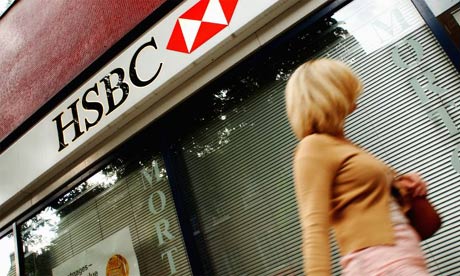HSBC profit slumps by 28% as US asset writedowns and bad debts rise
Bank's European operation sees profit rise 50% but credit crunch continues to cause problems with US mortgages
- guardian.co.uk,
- Monday August 04 2008 12:31 BST
- Article history

HSBC: first-half profits of $10.2bn are down by 28%. Photograph: David Levene
Profits at HSBC, Britain's biggest bank, fell by 28% in the first six months of this year as the credit crunch knocked its troubled US operations deeper into the red.
The 28% fall - the steepest reduction for seven years - was mainly due to increased bad debts and asset writedowns, which meant HSBC generated first-half profits of $10.2bn (£5.2bn), down from $14.2bn a year ago.
Europe generated the biggest profit of $5.1bn - a rise of 50% - while the US reported a loss of $2.8bn. The loss in the US was $549m greater than HSBC ran up in the second half of 2007 - demonstrating the deepening impact of the credit crunch.
HSBC's total impairment charge against bad debts was $10.1bn, up 58%, as a result of losses on its US mortgages, while its investment bank took $3.9bn of credit crunch writedowns.
Chairman Stephen Green described the first half of 2008 as "the most difficult ... for several decades" for financial markets and warned that the outlook remained "highly challenging with significant uncertainty".
The figures were broadly in line with forecasts but HSBC's shares were down more than 2% by midday at 817.5p.
HSBC was one of the first banks to flag the sub-prime mortgage problems in the US that have led to the credit crisis. In February 2007, it issued an unprecedented profits warning because of the problems in its US business and today admitted its operations there were still feeling the impact of the crisis.
Chief executive Michael Geoghegan said the bank was pulling out of its vehicle finance operations in the US where he said conditions "remained difficult". Its provisions for customers failing to pay loans on time rose in the US by 85% to $6.8bn - although the bank noted they were down in the second half of the year.
"The US remains a difficult market, with rising unemployment and falling house prices and we have recognised this with an impairment charge of $527m on the goodwill of our North American personal financial services business at group level," said Geoghegan.
This is the first time HSBC has had to reduce the goodwill associated with its acquistion of Household International, the business that has formed the core of its personal finance operations in the US, which it bought for £9bn in 2003 in what was the bank's biggest ever acquisition. Activist investor Knight Vinke believes Household is the "root of the problem".
"HSBC's management insists that Household can be salvaged by cuttting costs and downsizing the business. We disagree," said Eric Knight, chief executive of Knight Vinke. "Today's results come as no surprise to us. HSBC has a thriving and extremely valuable business in Asia which is why its share price has performed as well as it has in 2008 relative to that of other banks.
"We would point out, however, that the subprime and other credit-related losses incurred by HSBC in North America since the beginning of 2006 now exceed $32bn - that is to say more than all the profits earning in the emerging markets and Hong Kong over the same period," he added.
Douglas Flint, HSBC's finance director, again reiterated the bank's commitment to the US operation. He described the figures as "resilient" and noted that the charges for customers failing to pay their loans on time in the US were slowing.
Even so, he was reluctant to say the worse was over. "On the positive side, the rate of deterioration has definitely slowed, but we have had two quarters of seasonally good factors, with tax refund season at the beginning of the year and the fiscal stimulus package in the second quarter," Flint said.
In the UK, where the bank has been competing aggressively for mortgage business, the bank said savings balances were up 19% but current account balances down by 5% as the price of food and utility bills ate into customers' pockets.
In mortgages, its high-profile Rate Matcher campaign had led to a 38% increase in applications and helped the bank double its share of new mortgage business to 6% in the first half.
Its developing market operations reported higher profits. Hong Kong was up 30% at $3bn; the rest of Asia Pacific was up 35% at $3.6bn; while Latin America was 12% higher at $1.2bn.
Bruce Packard, an analyst at stock broker Pali International, was cautious. "HSBC management suggest that the deleveraging of the financial system plays to their strengths. The problems in the US were well flagged, but many investors may focus on underlying group revenue up 2%, suggesting that the strong growth in developing markets has not been strong enough to offset weakness elsewhere," he said.
The bank is paying a second interim dividend of $0.18 a share which, with the first interim dividend of $0.18, means the first-half payout is up 6%.
guardian.co.uk © Guardian News and Media Limited 2008

No comments:
Post a Comment